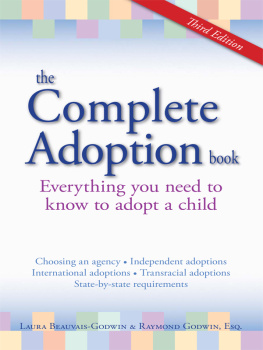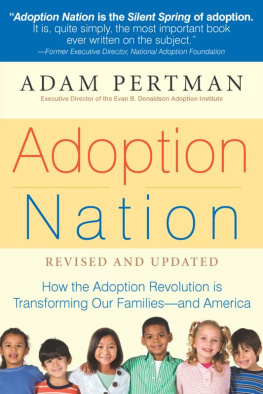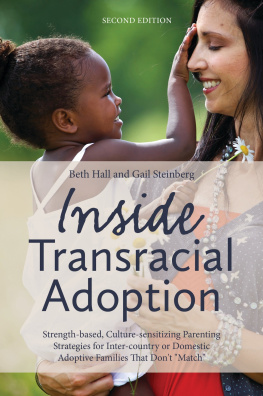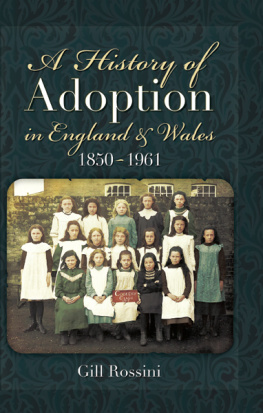University of California Press, one of the most distinguished university presses in the United States, enriches lives around the world by advancing scholarship in the humanities, social sciences, and natural sciences. Its activities are supported by the UC Press Foundation and by philanthropic contributions from individuals and institutions. For more information, visit www.ucpress.edu.
University of California Press
Oakland, California
2019 by Kathryn A. Mariner
An earlier version of Chapter 4 was previously published: Kathryn A. Ludwig, Unfulfilled Futures: The Fall-Through Phenomenon in Domestic Private Adoption, Advocates Forum (2012): 1327. Chapters 1 and 2 are derived in part from an article published in Ethnos 2018, copyright Taylor & Francis, available online at www.tandfonline.com/10.1080/00141844.2017.1377744.
Cataloguing-in-Publication Data is on file at the Library of Congress.
ISBN 9780520299559 (cloth : alk. paper)
ISBN 9780520299566 (pbk. : alk. paper)
ISBN 9780520971240 (ebook)
Manufactured in the United States of America
28 27 26 25 24 23 22 21 20 19
10 9 8 7 6 5 4 3 2 1
ACKNOWLEDGMENTS
This book is made of kinship and contingency, imagined and incubated in the best of company.
My first thank you goes to Judith Farquhar, serving as Director of Graduate Studies in the Department of Anthropology at the University of Chicago when I matriculated in 2008. When I went to her in the winter of my first year in the PhD program, twenty-two years old and awash in anxiety, and shared that I planned to change my research focus from indigenous languages of Central America to transracial adoption in the United States, she encouraged me and showed continued kindness and support for the next seven years as I pursued my degree and a new set of interests. I am very appreciative of her facilitation of my circuitous path. I am supremely grateful for the guidance and support of my dissertation committee: Joe Masco (for his constructive critique and numerous thorough readings), John Comaroff (for his responsiveness, critical interventions, and much-needed pep talks, often from halfway around the globe), Summerson Carr (for providing a social work perspective and offering crucial feedback on seminar papers, workshop papers, and resulting chapter drafts), and Julie Chu (for encouraging me to write the ethnography that I would want to read, and for reminding me that invisibility itself is a worthy object of analysis). Their encouragement and inspiration sustained me intellectually throughout the project and beyond.
During my doctoral program, I had the benefit of receiving less formalized (but no less important) feedback from my colleagues in a range of contexts. Jennifer Cole and the participants in her Winter 2013 and Winter 2015 Ethnographic Writing seminars helped greatly in the development of the project as a whole. I would also especially like to thank the participants and coordinators of the U.S. Locations Workshop, the Reproduction of Race and Racial Ideologies Workshop, and the Clinical Ethnography Workshop at the University of Chicago, as well as the Susan B. Anthony Institute Work-in-Progress Seminar at the University of Rochester. Special thanks is also due to the coordinators, discussants, participants, and attendees at panels where I presented my work at conferences hosted by the American Anthropological Association, the National Womens Studies Association, the Alliance for the Study of Adoption and Culture, the Adoption Initiative, and the University of ColoradoBoulder Department of Anthropology. Several of my fellow graduate students also played an important role in the development of this project outside of classroom, conference, and workshop contexts, particularly my 2014 writing group (Duff Morton, Adam Sargent, and Gabriel Tusinski) and other valued interlocutors (Ella Butler, Christine El Ouardani, Karma Frierson, Jonathan Rosa, Aaron Seaman, Lisa Simeone, Matilda Stubbs, and Talia Weiner). Toward the end of dissertation writing, the support and camaraderie of Shirley Yeung, Madeleine McLeester, Mary Adekoya, and Haley Stinnett was invaluable.
Special recognition is owed to my friends and colleagues at the University of Chicago School of Social Service Administration. Particularly valuable were courses taught and guidance offered by Summerson Carr, Gina Samuels, Joan Palmer, and William Borden. The editorial team at Advocates Forum offered critical peer review that helped shape and refine an earlier version of chapter 4. I am indebted to my Mellon Mays Undergraduate Fellowship family at Stanford, University of Chicago, and beyond, for their friendship, fellowship, and continued faith in my ability to succeed, particularly participants at the 2011 Proposal Writing and Dissertation Development Seminar and the 2014 Preparing for the Professoriate Seminar. Since I am at heart a social animal, I am hugely appreciative of various writing groups, bootcamps, and retreats: I am grateful for UChicagoGRAD, the Mellon Mays Graduate Initiatives Program, the University of Rochester Susan B. Anthony Institute Writing Group, and my incredibly consistent and intrepid accountability partner, Molly Ball.
My research was supported by generous funding from the National Science Foundation Graduate Research Fellowship Program, the Illinois Board of Higher Educations Diversifying Faculty in Illinois Fellowship, the University of Chicago Division of Social Sciences Graduate Aid Initiative and Orrin Williams Travel Grant, the University of Chicago Office of Multicultural Student Affairs Research Initiative Grant, and grants from the Mellon Mays Graduate Initiatives Program (supported by the Social Science Research Council and Woodrow Wilson Foundation). The final year of dissertation writing was made possible by the generous support of a Mellon/American Council of Learned Societies Dissertation Completion Fellowship. Many thanks are due to Anne Chien at the University of Chicago Department of Anthropology for her administrative work behind the scenes, which made so many aspects of both my training and this project possible; I certainly could not have done this without her. Additionally, I would still be in my office transcribing interviews and staff meetings if it were not for my careful (and miraculously speedy) transcriptionist, Rebecca Hannah Fraimow.
The University of Rochester provided a supportive environment in which to develop my dissertation into this full-fledged book. I am grateful to the Frederick Douglass Institute for African and African-American Studies (under the leadership of Cilas Kemedjio and the administrative support of Ghislaine Radegonde-Eison), which provided funding and both the physical and mental space to let the project breathe. I am also grateful to the Department of Anthropology (under the leadership of Daniel Reichman and the administrative support of Donna Mero), which has proven a warm and collegial institutional home. I am especially grateful to the Humanities Center (under the direction of Joan Rubin with the administrative support of Jennie Gilardoni), which provided a generous internal fellowship in the fall of 2018, and also hosted a full-day manuscript workshop in April 2017 in which Laurence Ralph, Linda Seligmann, and Eleana Kim provided generous and thoughtful critiques of the text. I am indebted to these scholars for their insights, which have greatly shaped the present manuscript, alongside conversations with numerous others including Stevie Larson, and also Katherine McKittrick, who in particular helped me hold the weight of wrecked cars and hearts. Sometimes one conversation can change everything.







